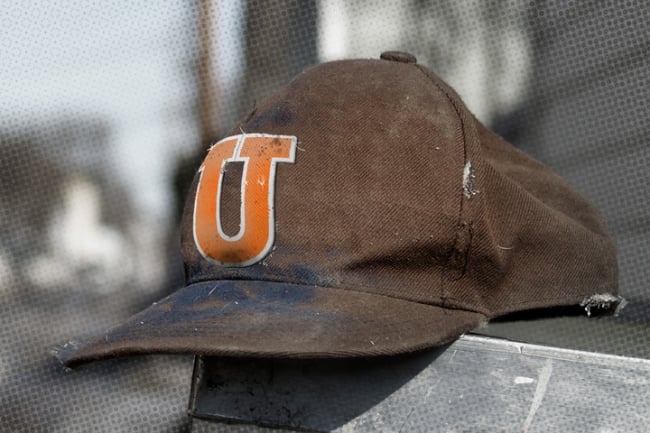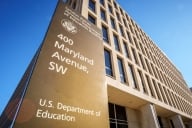You have /5 articles left.
Sign up for a free account or log in.

Business officers at this year’s NACUBO conference shared tales from the trenches, best practices and worries about political, social and financial issues.
Photo illustration by Justin Morrison/Inside Higher Ed | Joe Christensen/iStock/Getty Images
CHICAGO—Hundreds of college financial officers gathered in the Windy City this week—many delayed by travel issues caused by the CrowdStrike outage—to share insights about the state of higher education.
The annual National Association of College and University Business Officers conference offered the higher education business community a chance to commiserate over enrollment challenges, rising costs and political tensions on campus, among other things. During three days of panels and discussions, attendees shared tales from the trenches, best practices and worries about the political, social and financial issues looming on the higher ed horizon.
Here is a look at two big themes that emerged from this year’s NACUBO conference.
Reputational Crises Loom Large
Beset by soaring costs, sprawling scandals and a barrage of criticism from elected officials—particularly Republicans—higher education has experienced a public crisis of confidence in recent years. Opinion polls show that the sector, once a bastion of public trust, has suffered significant reputational damage in recent years. Last year, a Gallup poll found public confidence in higher education at an all-time low.
Those concerns sprang up in numerous panels and conversations at NACUBO.
One panelist, speaking at a Sunday morning session focused on the role of trustees in risk oversight, noted that the widely covered student protests related to the Israel-Hamas war this spring were absent from many campuses, yet they negatively affected the reputation of higher education as a whole.
Catharine Bond Hill, managing director of the higher education consulting firm Ithaka S+R and a trustee at Yale University, argued that reputational damage stemming from the protests, which were unpopular off-campus, “is a major source of risk going forward” for all institutions—even though they were concentrated at highly selective, well-resourced universities.
Reputational concerns also cropped up on a Monday panel that Inside Higher Ed hosted. In response to a question posed by this reporter, who served as moderator, panelists acknowledged that protests will probably resume in the fall, with the Israel-Hamas conflict likely ongoing in what is expected to be a fraught election season.
Panelist Bronté Burleigh-Jones, chief financial officer, vice president and treasurer at American University in Washington, D.C., said that her campus is gearing up for protests ahead of the 2024 election. She said AU has revisited a number of policies “so that we are prepared and can articulate any changes in those processes and policies going forward.” She added that parents and students have expressed apprehension about the new school year.
“We’re bracing ourselves for what the fall semester will be. I think some of us have actually seen parents reacting to what might be happening in Washington, D.C., and some parents choosing that their child is going to take a year off and potentially not be in the city, given some of what happened as a result of the last election cycle. So we’re very, very aware of the potential for unrest on campus,” Burleigh-Jones said.
Political Uncertainty Ahead
On Sunday, as the conference got into full swing, President Joe Biden dropped a bombshell, announcing that he would not seek re-election but would instead throw his support behind Vice President Kamala Harris to lead the Democratic ticket.
The announcement landed ahead of a NACUBO panel titled Navigating Higher Education Policy in an Election Year: Updates From Washington, rendering its program description—which emphasized “electoral uncertainties”—especially relevant a little more than 100 days before voters go to the polls.
What that means for higher education remains unclear. Former president and Republican nominee Donald Trump has attacked higher education at times, embracing GOP rhetoric that casts universities as wildly liberal. Trump’s running mate, Ohio senator JD Vance, once declared professors “the enemy” and has been highly critical of the sector despite his own Ivy League credentials.
Harris is largely expected to continue Biden’s agenda—including his ambitious plans to enact student loan forgiveness, an effort that has been mired in legal challenges. The Biden administration has also drawn sharp scrutiny for its bungled rollout of an overhauled Free Application for Federal Student Aid, which has undermined FAFSA completion rates and created headaches for students, parents and college officials as they navigate a crucial but flawed instrument ahead of the upcoming academic year. (The FAFSA fiasco was the subject of surprisingly little conversation at NACUBO, at least in the panels and discussions where an Inside Higher Ed reporter was present.)
Liz Clark, vice president of policy and research at NACUBO, said on the policy panel that while she expects sharp rhetoric to flow from politicians, she believes most talking points will not lead to new legislation—at least not this year, with a divided Congress.
But audience members expressed concerns about political actions that could damage higher education. One attendee asked about the possibility of eliminating the U.S. Department of Education, a talking point in some Republican circles and a proposal put forth in the notorious Project 2025 blueprint for conservative governance developed by Trump-world figures at the Heritage Foundation. To Clark, however, the idea seems unlikely even if Trump is elected.
“I think this is a great example of understanding what’s election-year rhetoric and what’s reality. You’re going to hear a lot between now and Election Day. It’s going to be politicians trying to get the attention of voters … I would say calling for the elimination of the Department of Education will certainly get attention, but if a president really wants to cause reform or make reform in education, they’re going to need a Department of Education to do it,” Clark said in response to the question.
The uncertainty around the upcoming election was also featured in a main-stage presentation from NBC journalist Chuck Todd. A description of his presentation promised “razor-sharp analysis of the political landscape in the run-up to the 2024 election,” with an outlook for 2025. That session, however, was closed to the press—at Todd’s request, NACUBO confirmed.








